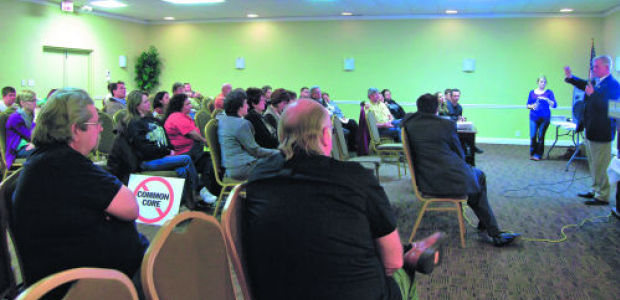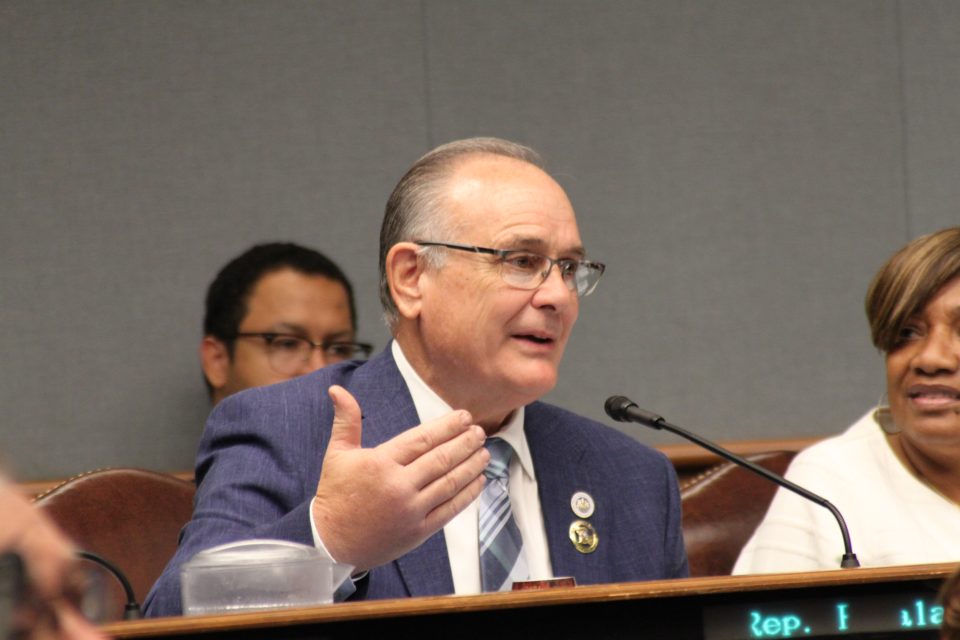Bi-parish boundary committee picked
March 11, 2014OUR VIEW: Keep an eye on Common Core this session
March 11, 2014Brooke Falgout, a St. Mary Parish mother of seven, was so disturbed by her research into Common Core State Standards that she pulled three of her children from the public school system and began homeschooling them.
Like many of her fellow parents against Common Core, Falgout sums up nationalized educational standards as an encroachment upon states’ and parental rights, a conspiratorial effort to brainwash children and, by way of suggested textbooks associated with CCSS, an encumbrance of youthful innocence.
“When I started seeing what was coming with Common Core, it was scary,” Falgout told a crowd of about 30-40 people gathered at a town hall-styled Common Core meeting last week at Houma’s Ramada Inn. Falgout has conducted research into the standards for the past six months and gives her presentation two or three times each week to audiences throughout the state. “The parents who are up in arms fighting, we see what is coming.”
***
Louisiana in 2010 by way of the Board of Elementary and Secondary Education became one of 45 states to adopt the standards, which aim to align student output on a national level with uniform knowledge and skills benchmarks. Proponents claim CCSS will improve student learning while building a competent workforce for the future. Rigorous, elevated expectations will drive a learning renaissance, they say.
Thus far, standards have been introduced in English and math. In English, for example, kindergarteners will be expected to compare and contrast the adventures and experiences of characters in stories, as described on corestandards.org. Fifth graders will be expected to describe how a narrator’s point of view influences how events are conveyed.
In Louisiana, CCSS were implemented in full for the ongoing school year. Beginning with 2014-15, however, the state will begin using the Common Core-aligned Partnership for Assessment of Readiness for College and Career assessments to measure whether districts, schools and teachers are meeting the heightened requirements. Since last month, the Louisiana Department of Education has released daily PARCC sample questions.
In the face of loud opposition, Louisiana’s education leaders agreed to soften for two years accountability measures related to CCSS, such as using a curve to tabulate the statewide letter-grading system applied to districts and schools. PARCC testing of high-school students was also delayed.
DOE has also emphasized local jurisdictions will ultimately determine curriculum and lesson plans.
Louisiana introduced a three-tier system of classifying resources districts can pull from to use in attempts to meet CCSS, with Tier 1 being the material most highly recommended.
For math, the Eureka programming – crafted at Louisiana State University – is in Tier 1 for kindergarten through 12-grade instruction.
In English, Core Knowledge is the only material on the premium level, stretching from just kindergarten to third grade. Multiple options are offered in Tier 2 to cover K-12.
Other CCSS-geared curricula are expected to be approved, but DOE has put a moratorium on its approval of material until the Legislature reviews the process.
Parents have said they fear some children will struggle during the period of transition toward Common Core standards, pointing out that increased expectations are being implemented before a range of curricula is developed. Teachers have expressed concern that they’re being asked to learn how to teach to standards on the fly while their livelihoods hang in the balance by way of tougher evaluations.
***
The rise of the CCSS opposition resembles that of the Tea Party ahead of the 2010 mid-term elections, anger festering during one-sided gatherings such as the one in Houma last week, which was hosted by a parent who homeschooled his children. They readily branded the sum of CCSS opponents as David versus the biblical beast and framed the importance of the upcoming legislative session as the last chance to spurn external control over their children’s minds.
“We’re not educating children anymore; we’re manipulating them psychologically,” said Kathryn Goppelt, an Ascension native who considers herself an expert on Common Core and gives her presentation statewide. “The goal of national standards is that we’ll have national curriculum with national tests. Guess who’s in control of that. Not you and me, not the parents, not the local school districts, not the state government.”
Goppelt, who homeschooled her children, further complained that Catholic schools have embraced CCSS.
“Eighty percent of our children that will be in our society go to public school,” she said. “The others go to private, and if a large percentage of those are getting Common Core, how many percent are you going to have left that don’t think and have this worldview. Not many, and that’s what they’re counting on.”
Proposed bills by state Sen. A.G. Crowe (R-Slidell), Rep. Brett Geymann (R-Lake Charles) and Rep. Cameron Henry (R-Metairie) aim to banish Common Core from the state’s public system, rework the framework of educational leadership and institute legislative control over crafting and enshrining any future state educational standards, as well as posing other changes to education. Other legislators have filed bills that would delay or kill Common Core and its related testing.
Locally, state Reps. Joe Harrison (R-Napoleonville), Jerome “Dee” Richard (No Party-Thibodaux) and Lenar Whitney (R-Houma) have come out to oppose Common Core.
“This is a very well-orchestrated system that we’re looking at,” Harrison told the gathering. “It’s like tentacles, they reach out everywhere. … It’s a political experiment on our public, on our children. And it’s going to teach them to be channeled into what they want them to be, not what that child wants, but what they want them to be.”
Whitney at last week’s meeting encouraged CCSS opponents to address state lawmakers with respect when voicing their opposition. She pointed out many withstood widespread public outrage during educational reform bills passed two years ago.
Before the Common Core-related bills can be voted on by state lawmakers, they must pass through education committees in both chambers of the statehouse.
“You’re trying to appease to someone,” Whitney told the crowd. “You’d like for someone to give you a fair chance of having your legislators all vote on the issue, as opposed to just a select committee to vote on it. So when you go before your committees, know that most of these people were for education reform or certain aspects of it. They may have alliances with the education department, the governor or whomever they were with before.”
Some in attendance agreed with the recommendation.
“You’ve completely won over the conservative movement … but don’t be so incredibly shortsighted that you think that people who were for this before are your enemy,” said one man, who declined to be identified. “Once you win them over, they’re your friends. … They were on it for all the right reasons, as I told you earlier. They’re concerned about the labor force.”
Others harbored more fury. One pledged not to “kiss some politician’s butt just because they got elected … If you’re not angry, you’re not paying attention, and I want them to hear the anger that there is in this country.”
As the informative portion of the Houma meeting continued, Falgout raised concerns about the content the standards would introduce to the classroom. She referenced Toni Morrison’s 1970 novel “The Bluest Eye,” a book that deals with real issues of racism, incest and rape.
Morrison’s novel has served flashpoint for Common Core outrage since it was mentioned in an appendix to Common Core standards. A passage from the novel was used to demonstrate the suggested difficulty level of reading material students should be able to understand at the 11th-grade level. The passage was printed alongside dozens of other passages and was not listed as a mandatory component attached to Common Core. Further, the “The Bluest Eye” passage did not contain the controversial elements of the book that outraged parents.
“This is disgusting,” Falgout said after reading an explicit excerpt from the novel. “This is just a little bit of what’s in that book. When I read that, I was disgusted. I have a 10th grader; I do not want her reading that garbage. What happens to our 10th-grade boys? They’re going that’s what it feels like to be with a 7-year-old, because you’re in the mind of a pedophile in that book. He is raping a 7-year-old through the whole book. That’s a high-school read? Unbelievable.”
About 30-40 people gathered Thursday at Houma’s Ramada Inn for a town hall-styled meeting to bash the idea of nationalized education standards. Two Louisiana lawmakers spoke at the event as several presenters bemoaned practical and conspiratorial aspects of Common Core State Standards.










